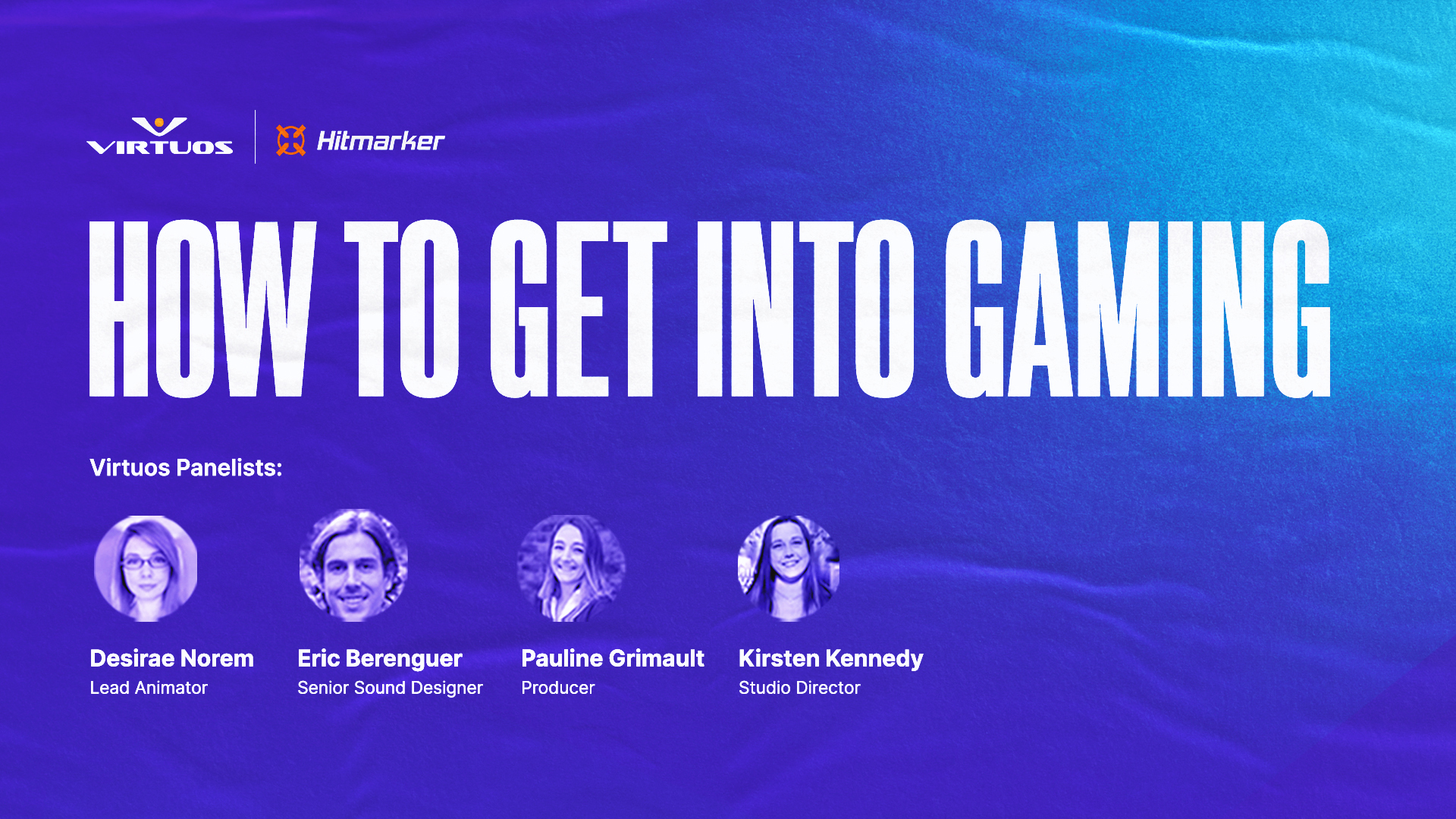As the popularity of video games as a mainstream form of entertainment skyrockets, game development has become one of the fastest-growing industries in the world. The game industry is vast and offers a wide variety of career paths for those interested to explore long-term careers.
On 22 June, we partnered with Hitmarker, a gaming and esports jobs platform to host a webinar titled “How to get into gaming”. Our experts shared their advice on how interested individuals can break into the video game industry during the panel discussion, followed by a networking session afterward:
- Desirae Norem, Lead Animator, Black Shamrock – a Virtuos Studio
- Eric Berenguer, Senior Sound Designer, Black Shamrock – a Virtuos Studio
- Pauline Grimault, Producer, Black Shamrock – a Virtuos Studio
- Kirsten Kennedy, Studio Director, Virtuos North America
- Milena Gerber, Recruiter, Black Shamrock – a Virtuos Studio
- Neha Verma, Senior HR Manager, Virtuos North America
- Moderator: Caity Emery, Community & Marketing Coordinator, Hitmarker

Virtuos X Hitmarker Discord Event: How to Get Into Gaming
Listen to the full panel discussion on YouTube here!
How to Make Your Portfolio Stand Out
Eric, Senior Sound Designer at Black Shamrock – a Virtuos Studio, recommended applicants to learn as many software programs as possible, since different companies may primarily use only specific programs. “It’s difficult to learn 100% about everything, but at least have a basic experience or knowledge about different softwares,” he said.
Desirae, Lead Animator at Black Shamrock, shared that hiring managers including herself often look at dozens of CVs and reels for each position. “One of the things that can catch people’s attention is if you can make them laugh,” Desirae pointed out. She added that it was also important to tell a story through your portfolio, especially when it comes to candidates applying for creative roles.
Kirsten, Studio Director at Virtuos North America, added:
“Generally, we like to see a varied style within the portfolio so you’re not just going in one specific style as well. If you’re going into an art role of any kind, show the breadth of what you can do.”
Another point highlighted by Pauline, a management trainee and producer at Black Shamrock, was the importance of having relevant personal projects that show one’s interest and desire to be in the industry. “Stuff like that says: this person really wants to create games and be in this industry, and he’s not waiting for someone to hire him to do it. He’s already doing it.”
The Importance of Networking
While sharing advice on how to start a career in the video game industry, the speakers stressed on the importance of networking, meeting the right people, and getting involved with relevant organizations. Pauline, who is a member of Women in Games (WIGJ), said that many members helped her better understand what it is like working in the industry and the day-to-day, and also meet a lot of people who are in similar roles as her.
“There are plenty of groups and it’s super easy nowadays to network on different platforms,” added Eric. “LinkedIn is one of my favorites, but there are plenty of groups on Facebook as well. For myself, there are very specific groups discussing sound design.” He highlighted that blogs and podcasts are also great resources to see how things move in a specific industry.
Don’t Be Afraid of Rejection
“So you’re going to send out CVs, reels, and basically your ‘life’ to us, and you’re going to face a lot of rejection, but don’t be afraid of that,” said Desirae, touching on the point of rejection. “Learn from your rejections, take that and figure out what you need to get better.” She shared that getting post-rejection reviews can be very helpful for one’s improvement as well.
“Please don’t be afraid to resubmit a little later to a company that you might have been rejected from, because you grow as much as their needs grow,” Desirae added.
“If you do resubmit, make sure that your work is updated, because people are going to remember the reels if you update your work, and they’ll be able to see that growth and that desire to be in this industry.”
Kirsten further shared that it was important to be “a little creative” in carving one’s path towards their dream job. “Don’t continuously go down the same roads and knock on the same doors,” she said. “If you’re struggling to get into a particular place that you feel would be a dream job, look tangentially for other similar opportunities so that you can get a little bit of experience and background that could make you more appealing to your potential dream place.”
Thank you to all of our speakers and almost 200 attendees for participating in this event. To find out more about entry-level jobs available in the video game industry, check out our article here. We hope that our attendees received helpful advice from our panel and networking session, and we look forward to seeing more talented individuals join the industry. Follow us on LinkedIn, Facebook, Twitter, and Instagram to get the latest updates on our upcoming events!
